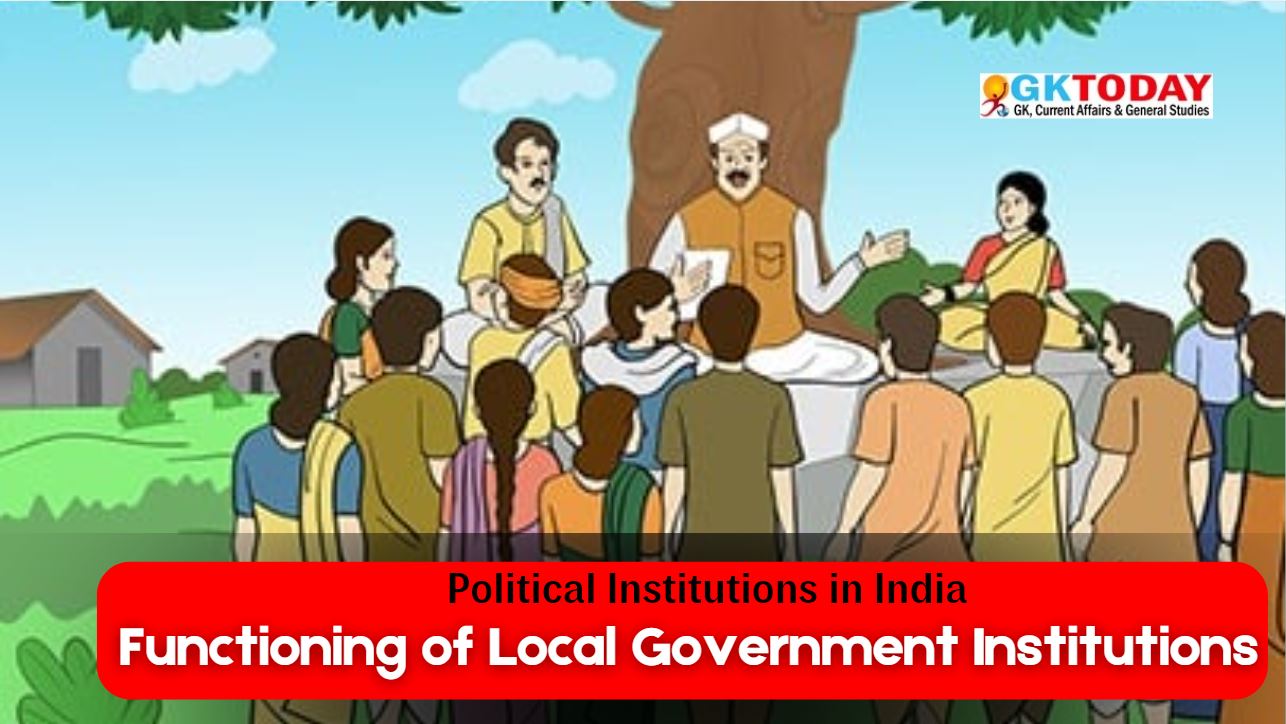Local Government Institutions in India [UGC NTA NET Political Science Notes]
Local government refers to the administration of specific local areas, such as municipalities or rural regions. Its main purpose is to decentralise power, enhance democratic participation, and improve governance. Local government enables communities to address their needs effectively.
Constitutional Framework
The constitutional framework for local government in India is established by the 73rd and 74th Amendments, both enacted in 1992.
73rd Amendment (1992)
– Panchayati Raj System – This amendment pertains to rural local governance. – Article 243 – It establishes a three-tier system comprising Gram Panchayat, Panchayat Samiti, and Zila Parishad. – Article 243A – It defines the powers, authority, and responsibilities of Panchayats. – Article 243B – It mandates the establishment of Panchayats at different levels.
74th Amendment (1992)
– Urban Local Bodies – This amendment focuses on urban governance. – Article 243P – It provides for the establishment of Municipalities. – Article 243Q – It categorises municipalities into Nagar Panchayat, Municipal Council, and Municipal Corporation. – Article 243R – It outlines the composition of these municipalities.
Structure of Local Government
Local government is divided into rural and urban categories, each with its own structure.
Rural Local Government
– Gram Panchayat – The elected body at the village level. – Panchayat Samiti – The block-level body that coordinates between Gram Panchayats. – Zila Parishad – The district-level body that oversees the entire Panchayati Raj system.
Urban Local Government
– Nagar Panchayat – Transitional body for areas shifting from rural to urban. – Municipal Council – Governs smaller urban areas. – Municipal Corporation – Manages larger urban centres, responsible for extensive urban services.
Elections and Representation
Local bodies are elected through direct elections. – Reservation of Seats – There is a provision for reservation for Scheduled Castes, Scheduled Tribes, and women, ensuring at least 33% representation for women. – State Election Commissions – These bodies oversee the conduct of local elections, ensuring fairness and transparency.
Powers and Functions
Local government institutions possess various powers and functions essential for effective governance.
Legislative Powers
Local bodies can enact laws and regulations tailored to local needs. For example, they can create local ordinances on waste management.
Executive Powers
They implement development programmes and manage local administration. This includes overseeing infrastructure projects and community services.
Financial Powers
Local governments have the authority to collect taxes, fees, and receive grants from state governments. This financial autonomy is crucial for their functioning.
Role in Development
Local government institutions play role in development initiatives. – Rural Development Schemes – They implement schemes like the Mahatma Gandhi National Rural Employment Guarantee Act (MGNREGA), which provides job security in rural areas. – Urban Planning – Local bodies are responsible for urban planning and infrastructure development, including roads and public transport. – Resource Management – They manage local resources such as water supply, sanitation, and waste management.
Challenges in Functioning
Despite their importance, local government institutions face several challenges.
Financial Autonomy
Many local bodies lack financial independence, relying heavily on state governments for funds.
Capacity and Training
There is often inadequate training and capacity-building for local officials, which hampers effective governance.
Political Interference
Political interference and corruption can undermine the functioning of local institutions, affecting their credibility.
Voter Turnout
Low voter turnout in local elections is issue, leading to unrepresentative governance.
Recent Reforms and Initiatives
To address these challenges, several reforms and initiatives have been introduced.
E-Governance
E-governance initiatives aim to enhance transparency and efficiency in local administration. Online platforms facilitate service delivery and citizen engagement.
Capacity-Building Programs
State governments are conducting capacity-building programmes to train local officials in governance and administration.
Strengthening State Election Commissions
Efforts are underway to empower State Election Commissions, ensuring free and fair elections at the local level.
Significance of Local Government Institutions
Local government institutions are vital for several reasons.
Democratic Participation
They enhance democratic participation by allowing citizens to engage in governance.
Empowerment of Communities
Local bodies empower communities to address their specific needs, encouraging local development.
Grassroots Governance
They facilitate grassroots governance, making administration more accountable and responsive.
Case Studies and Examples
Examining successful local governance models provides vital information about effective functioning.
Successful Panchayati Raj Institutions
States like Kerala and Karnataka have showcased successful Panchayati Raj institutions. These states have effectively decentralised power, resulting in better local governance.
Urban Local Governance Models
Cities like Pune and Ahmedabad have implemented innovative urban governance models. They focus on participatory planning and citizen engagement in decision-making.
Future Directions
Looking ahead, several directions can enhance the effectiveness of local government institutions.
Financial Devolution
There is a need for greater financial devolution to local bodies. This will empower them to function independently and meet local needs.
Disaster Management and Climate Change
Strengthening the role of local governments in disaster management and climate change adaptation is crucial. Local bodies can play a very important role in developing resilient communities.
Citizen Engagement
Promoting citizen engagement and participatory governance will enhance accountability. Involving citizens in decision-making processes encourages a sense of ownership.


